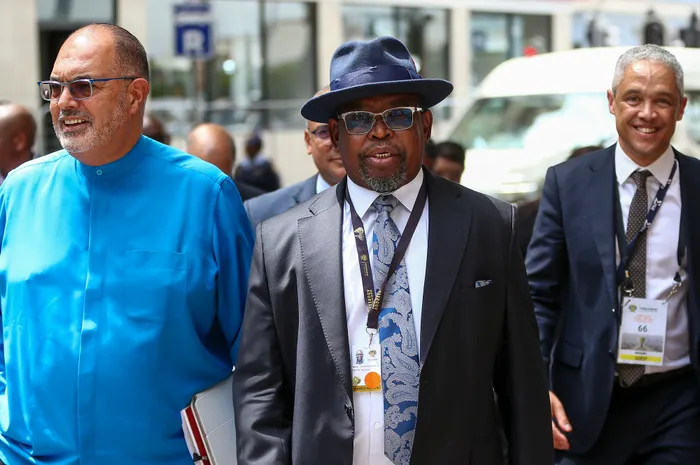Treasury DG Duncan Pieterse thanks colleagues for their sterling effort
Budget 2025

SA Revenue Services Commissioner Edward Kieswetter, Finance Minister Enoch Godongwana and National Treasury Director General Duncan Pieterse were photographed earlier this year.
Image: Independent Newspapers
The highlight of the interaction between the media and Team Treasury (including the South African Reserve Bank (SARB) deputy governor and the South African Revenue Service (SARS) commissioner) was the thanks that Treasury Director General Duncan Pieterse expressed to his colleagues in the Treasury.
Not only did the Treasury have to deal with three iterations of the Budget, but at the same time, they had to manage the hosting of the Finance Track of the G20, as well as running scenarios of what the impact of an erratic and frequently changing US tariff regime meant for exports and global growth.
The impact of this is visible in the growth projections between the February and May iterations of the macro-economic forecasts.
Economic growth in 2025 for the world and South Africa has been cut back to 2.8% and 1.4% respectively, from 3.3% and 1.9% forecast in February. The slowdown in global growth has meant that export growth was trimmed to 0.4% in 2025 from 3.4%. In the first quarter of 2025, the value of exports rose by 1.8% year-on-year (y/y).
Treasury has taken a leaf out of the World Cup-winning Springbok coach Rassie Erasmus’ playbook by building depth in its talent pool, but Pieterse did not disclose who the members of his “Bomb Squad” were.
“Treasury remains an employer of choice, and I take great appreciation and pride, as well as a lot of comfort in the resilience of our team,” Pieterse said.
Finance Minister Enoch Godongwana noted that media houses seem to have cut their budgets, as there were more journalists present in Pretoria for the media briefing compared with Cape Town. He said there was high public interest in the Budget process, but emphasised that there was overwhelming acceptance within the Government of National Unity that fiscal consolidation had to take place.
“The battle for fiscal consolidation has been won. The increase in the debt-to-GDP ratio since the February forecast is not due to higher expenditure, but rather due to the fact that nominal GDP, which is the denominator in the ratio, has been reduced,” he said.
SARS Commissioner Edward Kiesewetter said that SARS aims to appoint an additional 1 700 debt collectors this fiscal year. A total of 500 were appointed in April and are currently undergoing training, while a further 250 will be appointed in June. SARS has previously said it has detected 156 000 taxpayers who are not registered, or have not filed despite their substantial economic activity.
Godongwana said he was aiming for a R20bn increase in revenue next fiscal year. Kiesewetter said SARS would provide regular updates on how they were progressing with debt collection, so by the time of the October Medium Term Budget Policy Statement, Treasury would no longer have to search for the additional R20bn in revenue.
Godongwana said the fastest-growing component of the Budget was the allocation to infrastructure spending, as the theme of the Budget was to provide a sustainable fiscal policy that would cushion the economy from shocks and lay the foundation for future prosperity.
To that end, the government is focused on improving governance and the effectiveness and transparency of the guarantee framework, while at the same time supporting critical capital investments through different mechanisms, including credit guarantees, on-lending, and grant funding, where appropriate. That is why there has been a greater emphasis on “crowding in” private sector investment in infrastructure.
Visit: www.businessreport.co.za